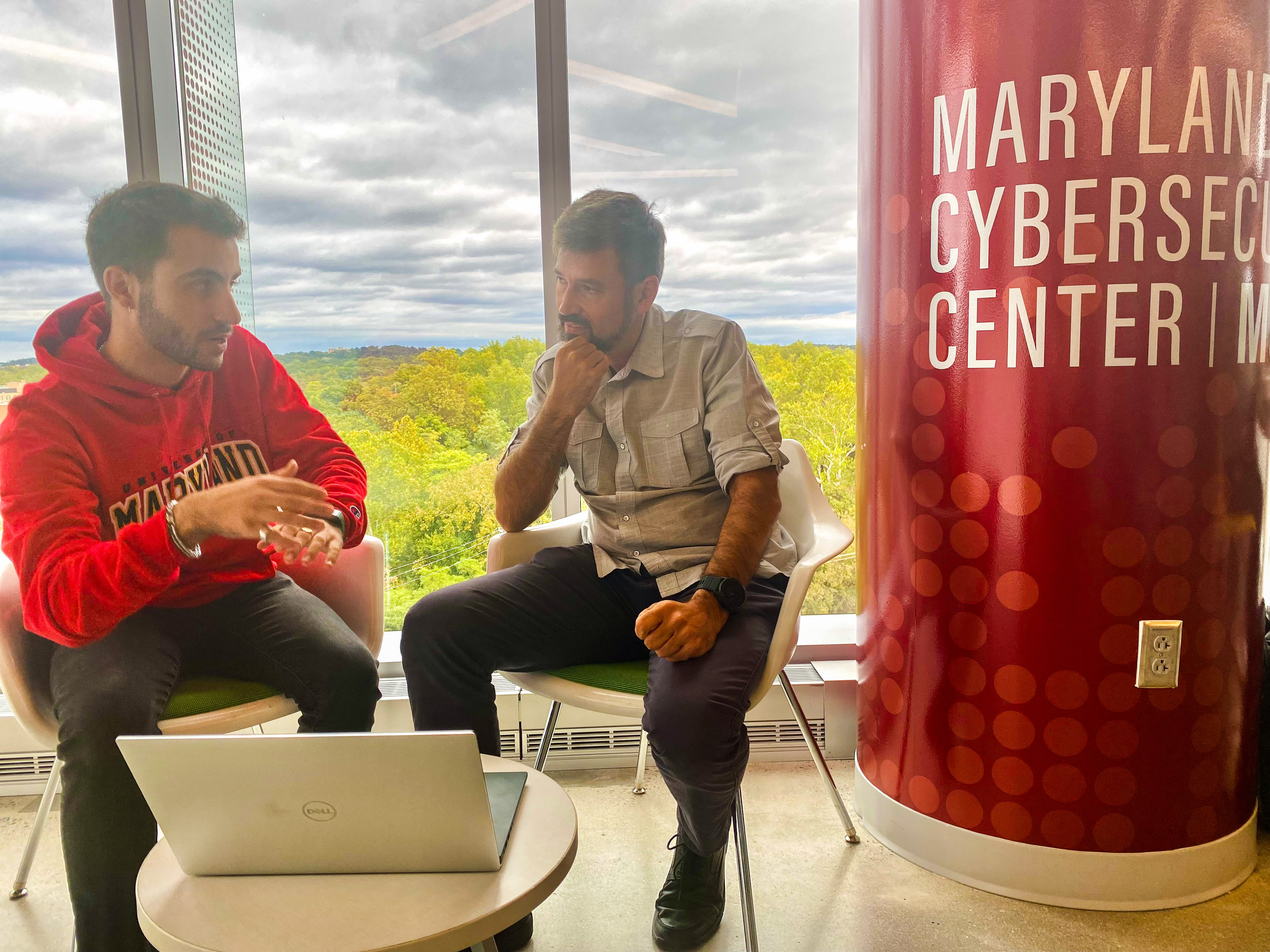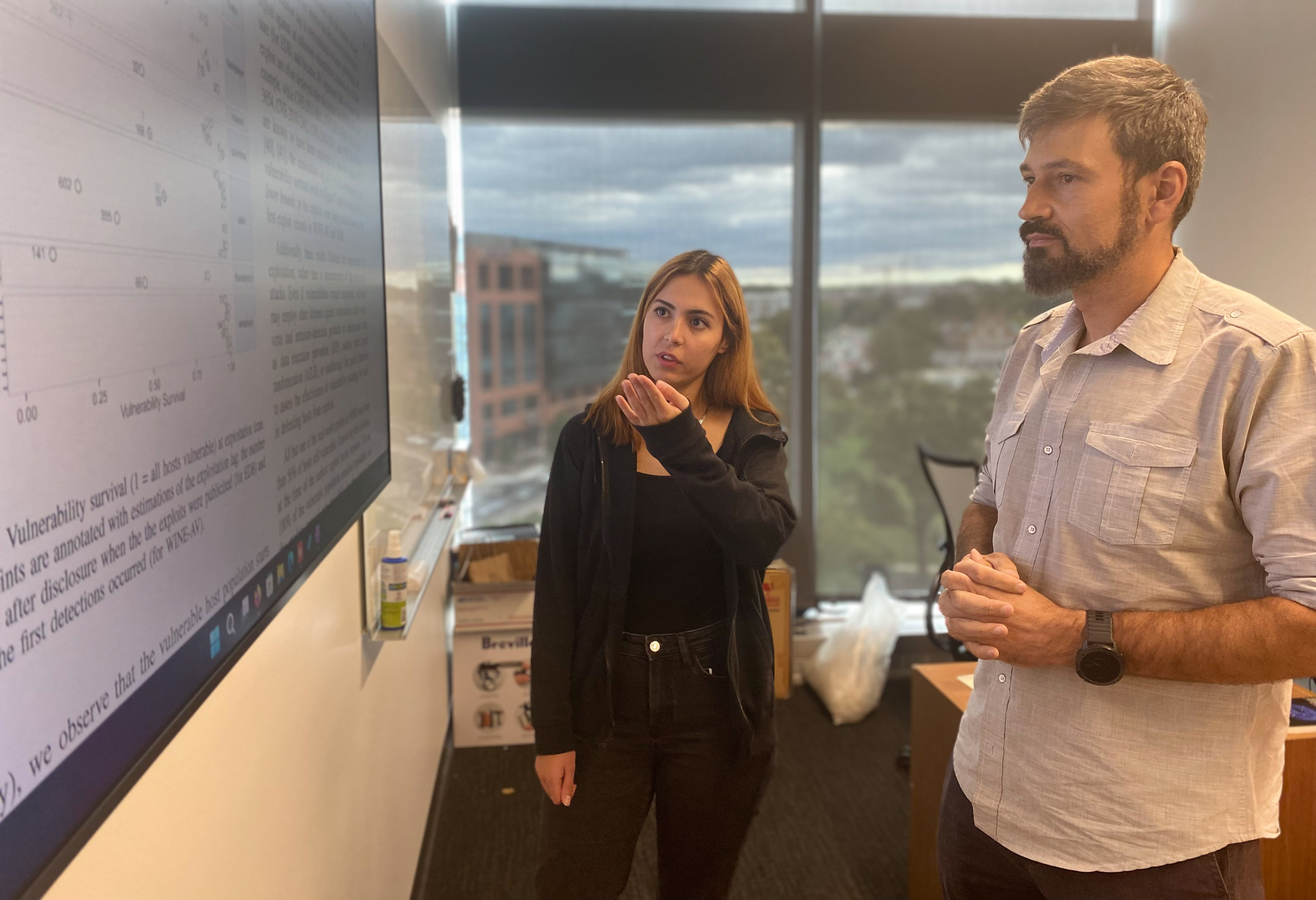Summer@MC2 2024 :: Discover Yourself with a Research Internship
Students with excellent academic results have the opportunity to take part in a paid summer internship in the Maryland Cybersecurity Center (MC2), to conduct cutting-edge research in computer security.
If you are passionate about Computer Science, a research internship can be an amazing experience that will give you a deep knowledge of security and will prepare you for a global career. Nicknamed Summer@MC2, our internship program attracts some of the best undergraduate students from around the world.
Why Summer@MC2

Our interns come to Summer@MC2 to discover who they could become. More than giving you a set of skills, research invites critical thinking, creativity, a competitive spirit and resilience to failures — essential qualities for achieving your full potential. The process of doing research is also fun and exciting, something you can enjoy apart from the outcomes.
Participating students work closely with MC2 researchers, typically to solve problems that are part of larger research projects. Our group works on a range of topics, including measurement studies (e.g. malware behavior, the code-signing PKI, online black markets), applications of data science (e.g. machine learning, natural language processing, graph mining) in security, systems security (e.g. Rowhammer attacks) and adversarial machine learnig (e.g. poisoning attacks, adversarial examples). For example, here is a selection of our recent papers: [USENIX Security’22] [NeurIPS’21] [USENIX Security’21] [ICML’21] [ICLR’21] [ICLR’20] [USENIX Security’19] [ICML’19] [NeurIPS’18] [CCS’18] [USENIX Security’18(a)] [USENIX Security’18(b)] [USENIX Security’18(c)] [CACM’18] [CCS’17] [NDSS’17] [CCS’16] [CCS’15] [USENIX Security’15] [OAKLAND’15].
MC2 is part of the University of Maryland, College Park. The center and the university are located in the metropolitan area of Washington, DC, a city with a vibrant social and cultural life. MC2 is one of the world's top 10 research centers in computer security, a group that accounts for more than 80% of the research that appears in our field's most prestigious publication venues.
Results from Summer@MC2 projects are often published in these venues. Two former interns have received Ph.D. degrees in Computer Science, and ten others are currently enrolled in doctoral programs at leading universities from Europe and the United States.
Project examples
- Octavian Suciu came to MC2 in 2014, from the Technical University of Cluj-Napoca (Romania). He chose to stay for a year-long internship and worked on analyzing the Twitter stream to predict which software vulnerabilities will be exploited in the future. His research was published at USENIX Security’15.
-
Yiğitcan Kaya came to MC2 in 2016, from Bilkent University (Turkey). He worked on adapting defenses against data-poisoning to a new kind of targeted poisoning attack.
Radu Mărginean came to MC2 in 2017, from the Technical University of Cluj-Napoca. He implemented this attack against convolutional neural networks.
These projects highlighted a need for realistic adversary models for attacks on machine learning. Together, Octavian, Yiğitcan and Radu proposed such a model in a paper published at
USENIX Security’18.
- The attack they had developed is nowadays known as clean-label poisoning, and it has inspired a lot of follow-on research.
- Kristián Kozák came to MC2 in 2017, from Masaryk University (Czech Republic). During his internship he uncovered a thriving black market for code-signing (Authenticode) certificates. His research was published at WEIS’18.
- Michael Davinroy came to MC2 in 2018, from Swarthmore College (USA). He worked on using cache side-channel attacks to steal neural-network architectures. He returned in 2019 to show that it is possible to steal unique, state-of-the-art architectures discovered through neural architecture search. His research was published at ICLR’20.
- Michi Panaitescu joined Summer@MC2 in 2020, from the University of Bucharest (Romania). Despite the global pandemic, which prevented us from holding Summer@MC2 on site, Michi worked on a year-long internship remotely. His project focused on creating unquantizable neural networks, which experience a drastic accuracy loss when applying quantization (a common method to compress and speed up DNN models), but behave normally otherwise. His research was published at NeurIPS’21.
Who should apply
Research internships are unlike other Computer Science internships, where you are given a well defined task and where you are expected to apply textbook solutions. Researchers work on open ended problems and use their knowledge and creativity to imagine new approaches that have not been tried before. Some students find this intimidating; research internships are the best fit for students driven by curiosity and by a desire to work at the cutting edge of knowledge. You must be self-motivated and willing to learn new things, and you must experiment with new ideas on your own, without being afraid of failures.

The typical applicants are undergraduate students in Computer Science or a closely related field, who are close to graduation or have recently graduated and who wish to complement their academic education with hands-on experience in computer security. For these students, working in a research lab is a great opportunity to acquire new skills and to interact with people who share their passion; prior research experience is also an important factor for admission in a top M.S. or Ph.D. program. Nevertheless, we will carefully consider all internship applications.
The main prerequisites for a research internship in MC2 are strong academic results and an interest in the research experience. We expect interns to have mathematical maturity and strong programming skills. Preferential consideration will be given to applicants with implementation experience in security, cryptography, operating systems, databases, distributed systems, data mining or machine learning.
Compensation
Interns will be paid a salary, commensurate with skills and experience, and the cost of travel expenses.

Application process
Internships are assigned competitively to the top applicants.
The application process has two steps. In the first step, fill the application form linked below. The following information is required:
- Your CV
- Your unofficial transcript
- Make sure your CV includes evidence of past research experience (e.g. papers published), systems programming experience (e.g., Github account info), interesting projects you worked on, etc.
- Contact information for one person who can serve as a reference.
- Explain why you want to do a research internship and why Summer@MC2, in particular, is a good fit for you. This is important.
Apply Here
If you are selected as a finalist, you will advance to the second step where you will be given a take-home test. The test will include reading assignments and open-ended questions, and you will have two weeks to solve it. You may choose the date when you will receive the test, so select two weeks when you have enough time to work on the test.
Timeline:
- Application (step 1) deadline: January 15
- Acceptance notification: March
- Internship duration: At least 12 weeks, usually June to September but flexible.
If you have any questions about the application process, email us at summeratmc2@lists.umiacs.umd.edu.
